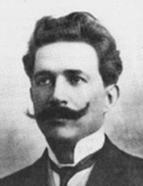

Manoel Bomfim was not a historian avant la lettre like other contemporary authors, such as Capistrano de Abreu and João Ribeiro (Gontijo, "Manoel Bomfim, 'pensador da História...'", 2003, p. 134). This becomes clear in the last book he published during his lifetime, where he defines himself as "someone who only wants a lesson from the past that will be useful for the future" ( O Brasil Nação ..., 1931, p. 9). Indeed, his historical reflection does not constitute "a theory of history or a historiographical project organised around systematised methodological propositions" (Gontijo, “Manoel Bomfim, ‘pensador da História’…”, 2003, p. 130). His arguments are supported by historical essayism. He operates with a pragmatic conception of history, whose instrumental value expands as the interpretation of the past can help in understanding the present (Matos, “Manoel Bomfim e Oliveira Martins”, 2015, p. 47).
It is undeniable that América Latina: males de origem was an original work, as it presents a new interpretation of the colonial past of the continent's nations. In the case of Brazil, rather than identifying the colonization process as the primary cause of the country's backwardness, Bomfim argues that the nation was shaped by the contributions of the three races that formed its population. He also contends that the feeling of independence was already evident in the nativist movements of the 18th century and the Pernambuco revolution of 1817. This interpretation challenges the historical tradition established in the 19th century by the Instituto Histórico e Geográfico Brasileiro [Brazilian Historic and Geographic Institute] (IHGB), with its most prominent work being História geral do Brasil [General History of Brazil], written by Francisco Adolfo de Varnhagen. According to the Institute, the independent state that emerged from the former Portuguese territories in America was the direct heir to the Lusitanian overseas empire— a legacy perpetuated by the presence of a representative from the House of Braganza on the Brazilian throne. In this context, Manoel Bomfim became a staunch critic of 19th-century Brazilian historiography (Rebeca Gontijo, 2003, p. 130), particularly targeting Varnhagen, whom he referred to as a "Bragantine reactionary" and "the author of a history for the throne" ( O Brasil na história ..., 1930, pp.122-125). In Bomfim's view, true historians should break away from the "perverse genealogy" of Brazilian historiography and recover nationalist values, which would form the foundation for the struggle for Brazilian emancipation. (Reis, “Civilização brasileira e otimismo…”, 2006, p.193).
This work is financed by national funds through FCT - Foundation for Science and Technology, I.P, in the scope of the projects UIDB/04311/2020 and UIDP/04311/2020.
